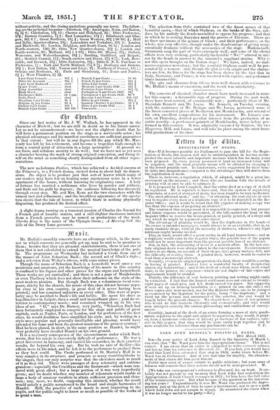rttrrs to 44 &Mr.
REGISTRATION OF DEEDS.
Sin—If it becomes possible for Parliament to pass the bill for the Regis- tration of Deeds, this session will not be undistinguished in having accom- plished the most valuable and important measure which has for many years been proposed. By every person possessed of land an increased value will be acquired, and the most available meatus will be afforded for charging it at the lowest possible cost. To landowners, every suggestion for their bene- fit sinks into insignificance compared to the advantages they will derive front the registration of deeds.
There is, however, a regulation which, if adopted, might be a great im- provement on the measure ; and those who are familiar with the details of printing will at once be able to estimate it.
It is proposed by Lord Campbell, that the entire deed or a copy of it shall be registered. He is reported to have said, that the system of registering memorials, or a sort of abstract of deeds, has been found to be very ineffective. "The most,effectual mode," said he, "of obtaining the real objects in view was to require every deed or a duplicate copy of it to be deposited in the Re- gister Office; and it would be Mend that the expense of making a copy was less than the expense of preparing an abstract." The wisdom of this airangement it is impossible to controvert ; but present and future expense would be prevented, if the bill enabled the head of the Register Office to receive the deeds printed, or partly printed, of a shape and use which he might by a general order direct. The advantage of printing would be, that the duplicates in the hands of the owner or intended mortgagee, would always be in an available, that is, an easily readable shape, without the necessity of abstracts, whenever any legal reference might become needed.
This, in itself, would effect a great saving in all legal transactions ; and as a duplicate would exist in the Register Office, the possible loss of the papers would not be more important than the present possible loss of an abstract.
But, in fact, the abstracting of deeds is a modern affair. In the last cen- tury original deeds were always taken to the conveyancers. No conveyancer desires to see them, on account of their shape, size, greasy surface, dirt, and the difficulty of reading them. A printed deed, however, would be easier to read than a manuscript abstract. Secondly, even in the original preparation of a deed, there would be a saving in having it printed. Printers have a wonderful faculty of deciphering almost any handwriting ; and if the draft of a deed were taken in its rough state, to the printer, lila expenses—which are not slight—of ilar copies and engrossment would be avoided. Thirdly, the difference of cost between printing and writing might easily be estimated. I find that the longest settlenient does not extend to twenty- eight pages of small pica, aud few deeds exceed ten pages. But supposing it were set up on foolscap broadsides, (i. e. printed on one side only,) and three copies only were needed, one for the Register Office, one to be stamped as examined by the Registrar for the party, being " the duplicate," and a third for the perusal and amusement of the solicitor, the cost would be largely below the present charges. We should have a class of law-printers who would do this business efficiently and economically, and who would soon interpret correctly the curious phraseology and contractions of convey- ancers.
Fourthly, instead of the deeds of an estate forming a mass of dirty parch- ments, repulsive to the sight and subject to separation, they would, if print- ed, form a handsome collection of literary preductions of law authors, valu- able in this respect, that they would be more easily kept together and be more available for reference than any parchments can be. T. F.


























 Previous page
Previous page